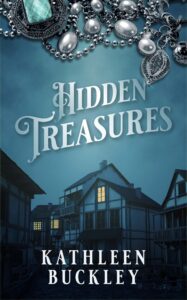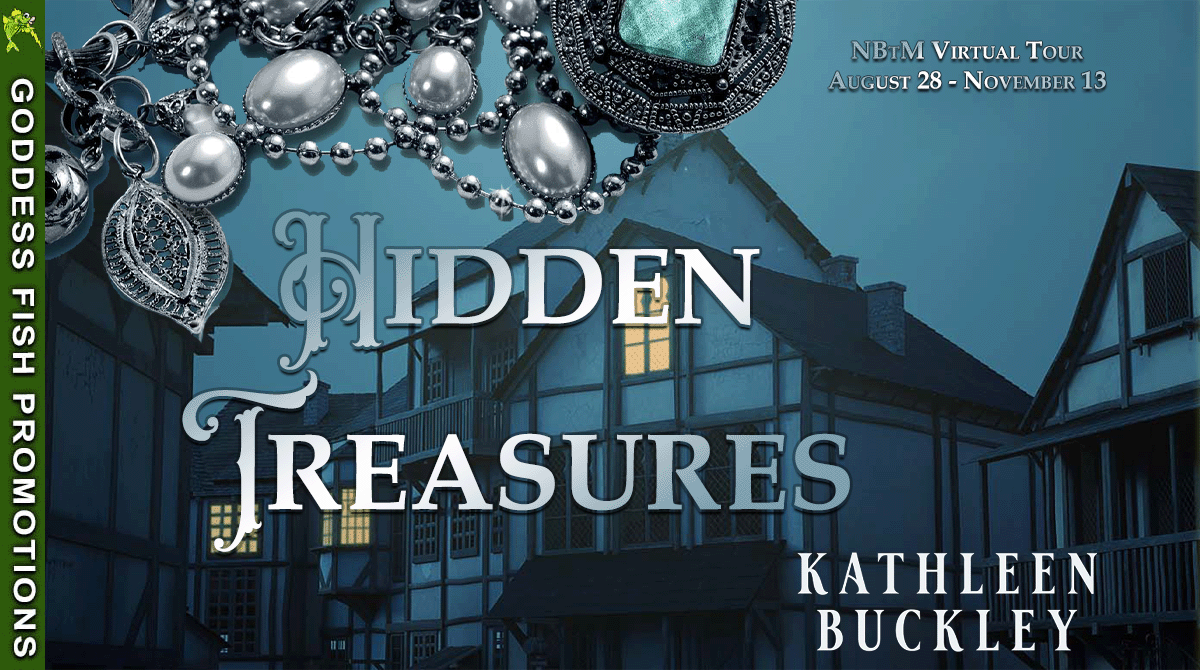Historical fiction author Kathleen Buckley joins me today to chat about her new romance, Hidden Treasures.

During her virtual book tour, Kathleen will be giving away a $25 Amazon or Barnes and Noble (winner’s choice) gift card to a lucky randomly drawn participant. To be entered for a chance to win, use the form below. To increase your chances of winning, visit her other tour stops and enter there, too!
Bio:
Kathleen Buckley wanted to write almost as soon as she learned to read. After a working career that included a hospital patient accounts department, a commercial print shop, temporary jobs, many years as a paralegal and a few years as a security officer, she moved to New Mexico. There the arts are in the air, and she settled down to write. Her first attempt at historical romance resulted in An Unsuitable Duchess in 2017. More novels set in the mid-eighteenth century followed. They deal with love, life, family problems, crime, and skullduggery of all sorts.
Most Secret, her second novel, was a finalist in the Oklahoma Romance Writers of America (OKRWA) International Digital Awards (2018) and in the Next Generation Independent Book Awards (2019). Most Secret was also awarded the five star “Highly Recommended” medal by the Historical Fiction Company (2023).
By Sword And Fan, her ninth novel, won first place, Historical division, Central Region Oklahoma Writers (CROW) National Excellence in Story Telling (NEST) contest (2024).
Welcome, Kathleen. Please tell us about your current release.
In Hidden Treasures, Rosabel and her little sister flee to London to escape their sinister new guardian and find themselves in danger of starvation…or worse. Hidden by an indigent women’s charity, her only hope of overturning the guardianship to become her sister’s guardian depends on an assortment of allies including a criminal or two, street boys, an old lady who knows criminal slang, and the natural son of a baron.
What inspired you to write this book?
The “heroine flees her home” trope is fairly common in historical romances. She seldom encounters any consequence more challenging than being courted by a nobleman. I wanted to turn it on its head by introducing some real danger. Another trope is the “illegitimate son of a nobleman makes good”. Allan, left a defunct coaching inn by his natural father, meets Rosabel while leasing the inn to a charity. Instead of ballrooms and house parties, their encounters take place the charity’s schoolroom and dining hall.
Excerpt from Hidden Treasures:
The object lay behind the candle. Gently, using her fingertips, she rolled the candle toward her. Once it was out of the way, she saw a ring a few inches from the left corner of the box. Without questioning why she was doing so, she studied the ring’s position before drawing it out from under the bed. By its weight, the heavy band was gold. The pink stone glowed in a beam of sunlight when she held it up.
Some signet rings were engraved with the wearer’s coat of arms, others with initials or another pleasing design, or perhaps a classical subject like a Roman god. This pretty stretching cat was an unusual subject for a signet. If Rose had misplaced such a thing, she would have informed the whole house. Then again, if she kept it put away and seldom wore it, she might not have noticed it was gone. She had never seen Stanbury wear the ring and if he did not wear it, how had it come to rest under the bed?
Transfixed, she stared at it. How, indeed? A rabbit or other small creature might freeze in just the same way on sensing a predator nearby. Had some premonition warned her to make certain of the ring’s position before she removed it? The explanation of its presence under the bed might have come from a novel, a class of literature of which she was fond, though she was not fanciful as a rule. Her first thought, that it was a trap to catch a searcher, struck her as farfetched until she remembered the locked study, the unnecessary dismissals of servants, and half a dozen other peculiarities in Stanbury’s behavior.
What exciting project are you working on next?
I recently began another Georgian period mystery. A lady disappears from a crowded evening party, leaving behind her wrap. The hostess does not know her or her escort as the entertainment was rather…non-exclusive. Her identity is discovered only when her servants reluctantly approach the hostess, as their mistress has not been home since leaving for the party a week ago. Fiona, the hostess’s companion, undertakes to search for her—and her escort—discreetly. A murder and a matter of inheritance figure in the story.
When did you first consider yourself a writer?
In the early 1990s, the late Robert Bloch (author of Psycho) bought two stories from me for anthologies Psycho-Paths and Monsters Among Us, anthologies he was editing. Let me hasten to add that he was not “late” at the time. Receiving $500 each seemed to me like the surest validation I was a writer. I still cherish the letters he sent me.
Do you write full-time? If so, what’s your workday like? If not, what do you do other than write and how do you find time to write?
I write for about four hours a day, from the time I get up around 4:00 a.m. until I finish swilling down my coffee several hours later. If it’s going really well, sometimes I write later, too, after senior exercise class, grocery shopping and any other pressing thing I have to do. While on the final stage of my eleventh book recently I probably did put in six or eight hours a day, but that was exceptional.
What would you say is your interesting writing quirk?
I don’t know if this qualifies as a quirk or just borderline OCD but I research compulsively. When my character in my second novel finds himself jailed in Dundee, Scotland, in 1745, I went looking for information about that city’s lockup in the mid-eighteenth century. Not only was there information available online, there was a drawing of it. At the time it was quite new. When my characters need firearms, I research period-appropriate flintlocks. That’s easy: there’s lots of material online because of both reenactors and collectors.
Maybe my readers don’t notice but I’m always a bit annoyed when I read a novel and some detail is wrong. Scones, for instance. Our modern scones did not appear until late in the 19th century because there was no baking powder or baking soda until the middle of the century, and it caught on only slowly. The original scone was an unleavened griddle cake.
As a child, what did you want to be when you grew up?
My earliest ambition was to be a reporter, preferably a foreign correspondent, probably as a result of watching an episode of a TV show, the name of which I have forgotten. This was back when there were still black-and-white shows. Then I wanted to be an astronaut. By the time I was in high school, I realized neither was a possibility: I hate asking intrusive questions and I wasn’t athletic or scientifically inclined.
Anything additional you want to share with the readers?
I try to write in the same vein as Georgette Heyer and Jane Aiken Hodge, and I hope those who love their books will like my historical fiction, too.
Links:
Website | Instagram | Facebook | Goodreads | BookBub | Amazon | Blog | Pinterest

